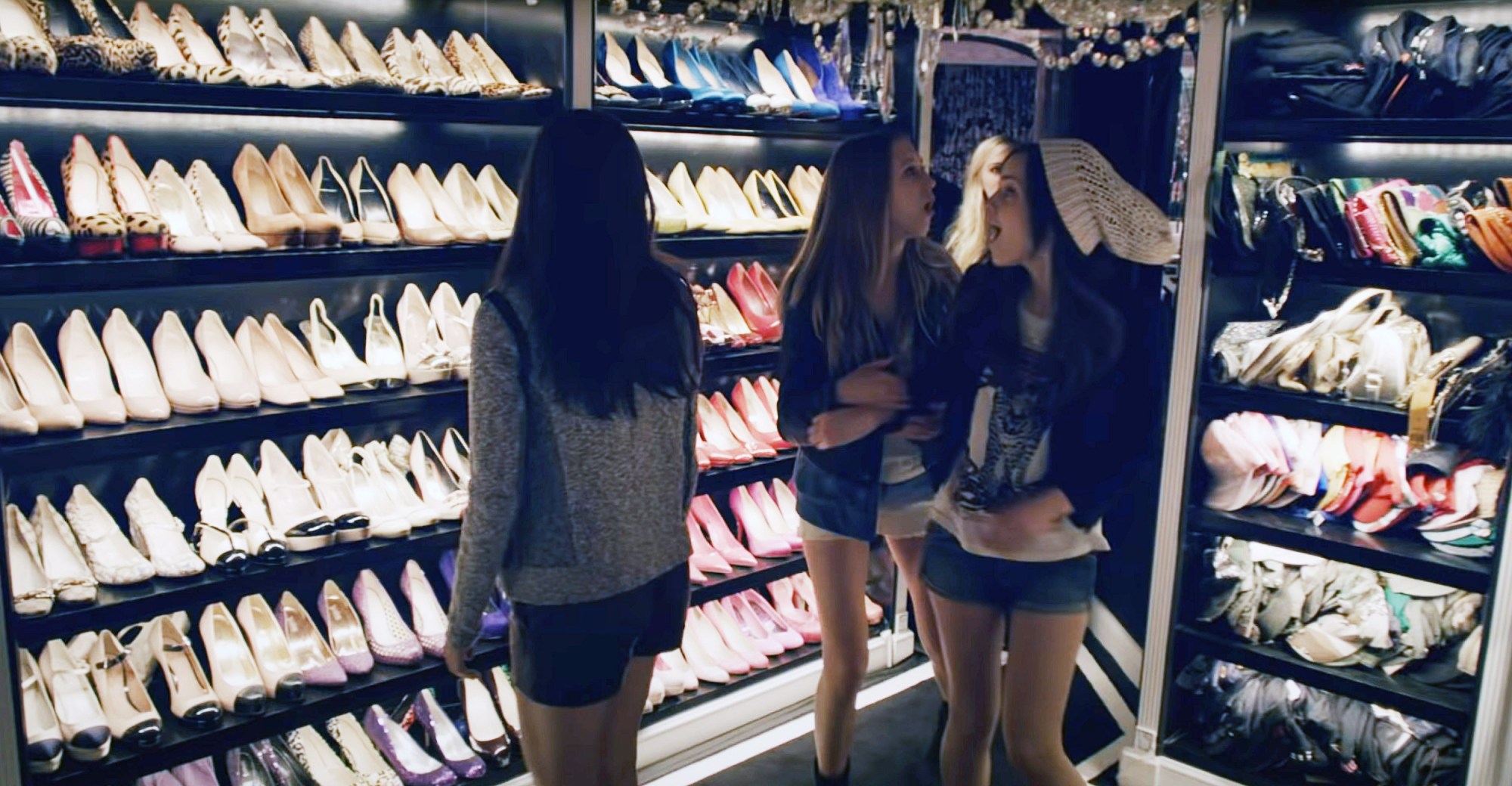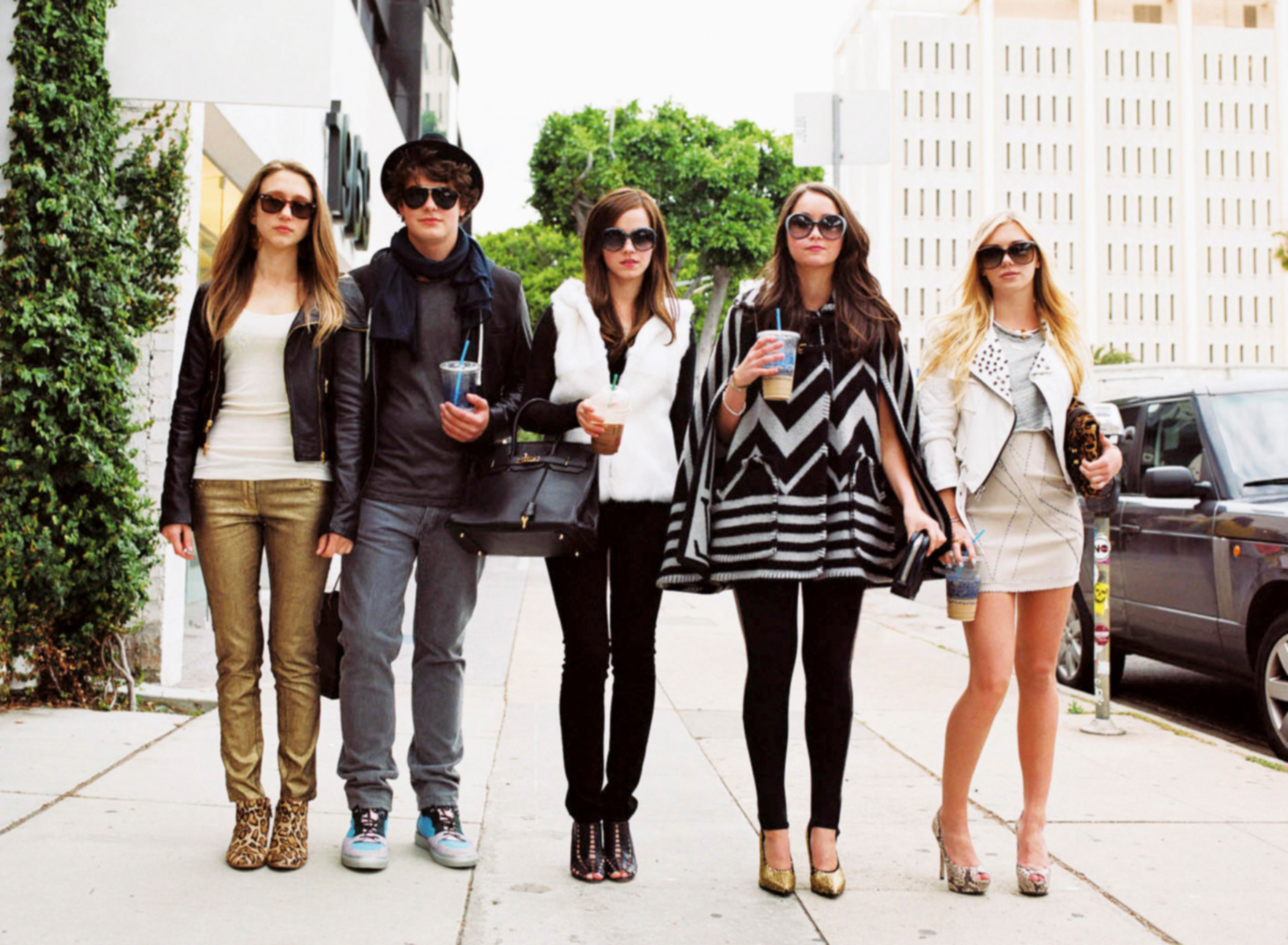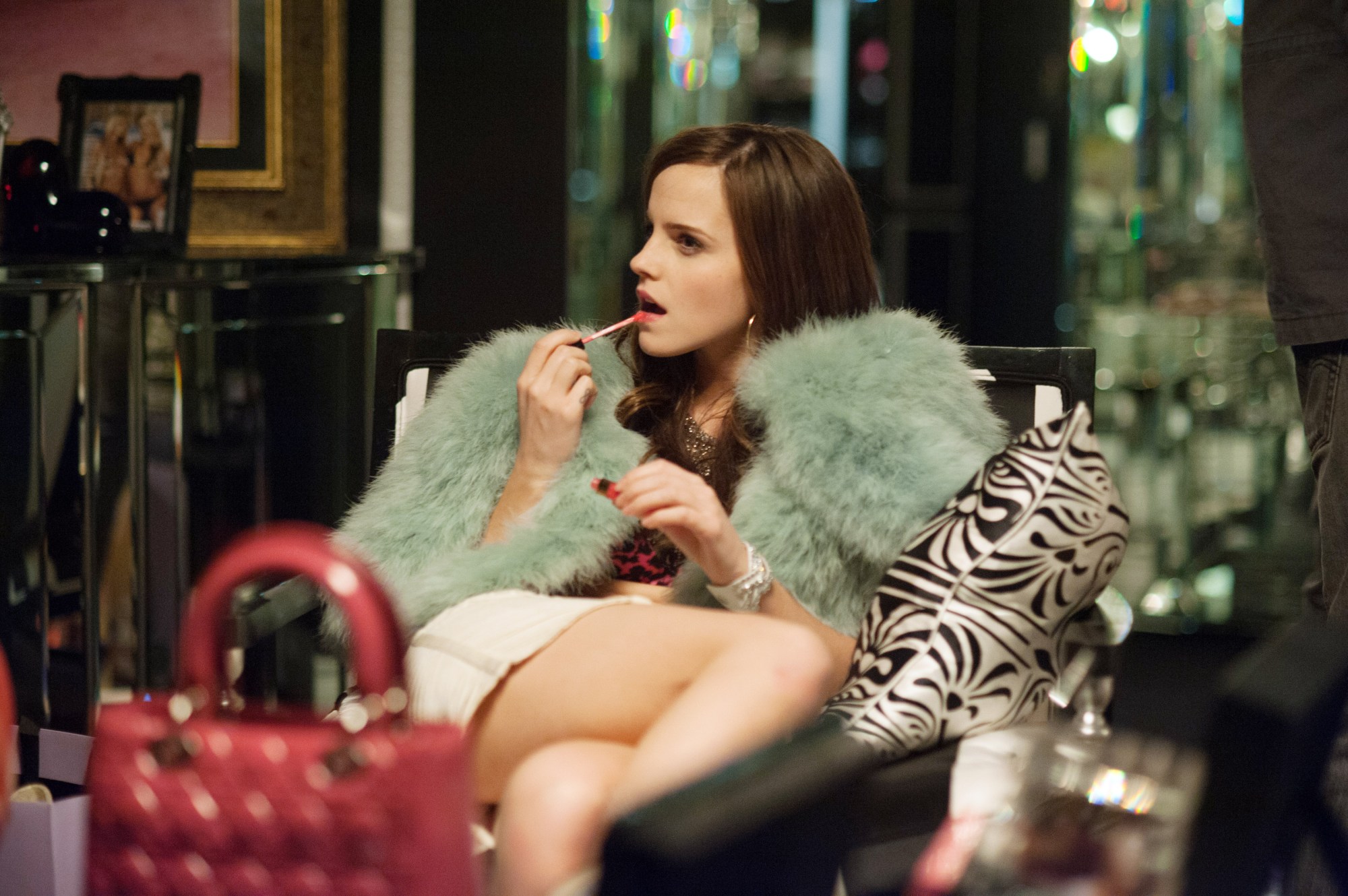When Uniqlo teamed up with Sofia Coppola early in 2023 to release a capsule collection based around her filmography, there was one clear omission from the line-up: a shirt featuring the immortal line “I’m a firm believer in karma”, as uttered in a pitch-perfect Valley Girl drawl by Emma Watson in 2013’s The Bling Ring. This disrespect aside, in the decade since the film’s release, her bratty, believable performance as the teenage terror Nicki Moore — based on teen thief Alexis Haines, nee Neiers — has aged like a fine wine, a perfect encapsulation of the late 00s, in all its celebrity-obsessed, hedonistic infamy.
In the space of six months, from October 2008 until August 2009, a group of five teenagers burglarised a handful of rich and famous residents of Beverly Hills, pocketing a suspected $3 million in cash and belongings from the likes of Paris Hilton, Lindsay Lohan, Audrina Patridge and Rachel Bilson. Paris was the group’s most frequent target — they robbed her at least five times — with clothes, jewellery, shoes, cash and, allegedly, the best coke in Hollywood Hills. But the most shocking part of the robberies wasn’t the amount taken; it was the simplicity of their execution. In the case of Paris, the teenagers found her house key under the doormat.
After Nancy Jo Sales wrote about the robberies and subsequent trial for the March 2010 issue of Vanity Fair, two notable things happened. Firstly, Alexis Neiers left Jo a furious voicemail, taking issue with her portrayal in the article, particularly the idea she was wearing Louboutins to court (“I wasn’t wearing Louboutins, I was wearing little brown kitten heels, fucking bitch!”). Second, Sofia Coppola read the article while on a flight, and found herself equal parts repulsed and intrigued by the story of the teenage burglars, social media flexing and the media circus that surrounded their eventual apprehension. Three years after the Vanity Fair article, The Bling Ring premiered at the European heart of opulence and conspicuous consumption: The Cannes Film Festival.

Back in 2013, Emma Watson was fresh off the back of playing preternaturally talented witch Hermione Granger for a decade. The year prior, she had supporting roles in My Week With Marilyn and The Perks of Being a Wallflower (the latter of which provided her first opportunity to bust out an American accent, something British actors have been doing for years with results ranging from the sublime to the unforgivable), but it was The Bling Ring which provided Emma with the biggest opportunity to finally break away from Harry Potter.
When we first meet Nicki Moore (Sofia chose to create characters ‘based’ on the real-life Bling Ring members rather than involving them directly), she’s standing outside a Los Angeles courtroom, giving an impromptu press conference. “I’m a firm believer in karma,” she tells the assembled reporters with the annunciation of someone who’s practiced their speech. “And I think this situation was attracted into my life as a huge learning lesson for me, to grow and expand as a spiritual human being. I wanna lead a huge charity organisation. I wanna lead a country one day for all I know.” In less than a minute of screentime, Emma sets up Nicki as a performer — someone who has a keen understanding of the media, and how to play a part. Her courtroom attire echoes outfits worn by Paris Hilton and Lindsay Lohan (who really did wear Louboutins to her trial for parole violation 2010) and the cadence of her voice indicates her little speech is well rehearsed. Every media appearance is an opportunity to control the narrative, and Nicki, while deflecting blame and showing no remorse, opts to make herself out to be a victim too.
Although Nicki isn’t the one who comes up with the idea to rob celebrities, she’s presented as the most extroverted and self-assured of the group. When she first meets Marc, the audience surrogate and newcomer to the clique, it’s in a lavish LA club that counts Kirsten Dunst and Paris herself among guests. She’s wearing an extremely 2009 lace minidress and reapplying pink Chantecaille lip gloss. “Oh my God, Jude Law totally keeps texting me,” she announces like it’s an inconvenience. “I’ll probably meet him later.” The others mock her for the outburst and Nicki’s face crumples into a perfectly petulant look of indignation. As the teenagers sit among the glitterati, they look around hopefully for celebrities and snap selfies to post on Facebook — photographic proof of their enviable lifestyle. Even Nicki’s enthusiastic dancing seems less about having fun and more a tactic to get noticed. For her, every public appearance is a publicity stunt, emulating her idols, and the idea of increasing that proximity delights rather than shocks her. When Marc and Rachel talk about their first break-in — into the Hilton heiress’s house — Nicki responds like it’s a nightclub: “Oh my God, no way, I totally wanna go to Paris’s”.
While some critics praised Emma’s SoCal lilt and attentive lip gloss application, The Guardian were more brutal (“Watson’s well-toned twit is afforded excess airtime”), while The Independent was more interested in how different the film was from Harry Potter (like, duh, as Nicki would say). But as an encapsulation of a very specific type of spoiled millennial teenager, Emma nailed it — and is owed a substantial apology by contemporary critics, considering how well the movie has aged. Reading reviews, it feels as though some viewers wanted a more scathing take from the director (one writer called the film “a specimen more than an analysis”), but The Bling Ring is all the more interesting for how disconnected and laconic it feels — much like the teenagers themselves, so far removed from reality as to repeatedly post evidence of their crimes on social media. If “pretend it’s a video game” was the refrain of Harmony Korine’s Spring Breakers — released a few months before The Bling Ring — here, the energy matches an episode of The Hills, where rich kids roll their eyes over petty drama and $50 salads.

It’s worth noting that Alexis has spoken out about Emma’s portrayal of her, notably in a 2020 interview with Ziwe, where she took issue with comments Emma made, citing her public struggles with addiction and sexual abuse, and suggesting the actress was insensitive for ignoring these. In the years since, Alexis has been working for a substance rehabilitation centre and seems to be in a much better place personally, which, of course, is really great to see. But Sofia’s film only claims to be based on true events, combining several real people into composite characters. It’s a Los Angeles fairytale, rather than an attempt to accurately portray the teenagers who made up the real gang of thieves. And in Hollywood, it’s a truth universally acknowledged that the legend will always win out against the truth.
Despite Alexis’ understandable reservations about Emma’s perception of her, there’s plenty about the character of Nicki Moore that still rings true. It’s a deliciously characterisation of a teenage nightmare. Perfectly at home lying to her parents about where she goes at night and pole dancing in Paris Hilton’s nightclub room, she’s a physical manifestation of the most egregious parts of 2010s pop culture: PerezHilton.Com, bodycon bandage dresses, Lancome Juicy Tubes, Rick Ross, Facebook and hair flat-ironed within an inch of its life. This was the era of conspicuous consumption, in which the Kardashians had just begun to emerge as a new American dynasty and reality television was dominated by the lifestyles of the rich and famous.
Although Facebook — where the incriminating selfies which would later be used in the case against the teenagers were posted — is all but defunct for young people a decade later, and the fashion, soundtrack and pop culture references of The Bling Ring firmly mark it as a period piece — the teenage Nicki Moores of the world still exist, grifting their way across Instagram and TikTok. While you might not be able to rob a celebrity for clout anymore, social media continues to amplify the cult of wealth, in part because it creates the illusion that anyone can be plucked out of obscurity and made famous (so long as they’re white, skinny and hot, anyway).
SUBSCRIBE TO i-D NEWSFLASH. A WEEKLY NEWSLETTER DELIVERED TO YOUR INBOX ON FRIDAYS.
This is the true beauty of Emma’s empty-eyed, pouty performance. Nicki speaks to a wider truth about losing oneself to the capitalist mindset and becoming nothing more than the ideal consumer. While the idea of robbing celebrities isn’t inherently problematic (eat the rich, baby!), the act wasn’t a radical form of wealth redistribution for the real-life teens or in Sofia’s version of events. Instead, it’s a means to get closer to the anointed few and achieve fame by proxy — a parasocial get-clout-quick scheme in which wearing clothes belonging to famous people becomes fame itself. At the end of The Bling Ring, Nicki gives an interview about her experience, claiming she heard Lindsay Lohan crying when they shared a cellblock in prison, once again feeding off her proximity. But she can’t resist a chance for self-promotion: “Anyway…” she says, before staring straight down the camera. “You can follow everything about me and my journey, at NickiMooreForever dot com.”
The actress might have been quick to distance herself from Nicki’s character, calling her “superficial, materialistic, vain [and] amoral”, but she was right to call The Bling Ring “a meditation on fame and what it’s become to our society”. A decade later, the locks have changed on the mansion of stardom, but plenty of people are still brazenly looking for a way in.


